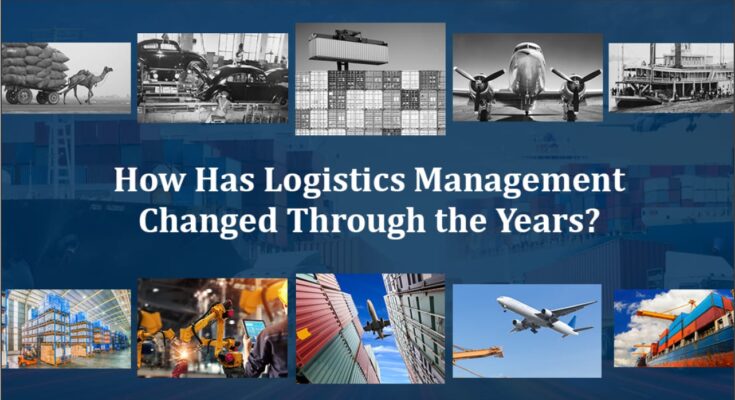Logistics management, the art and science of coordinating the movement and storage of goods and services, has undergone a remarkable evolution over the centuries. From rudimentary trading routes in ancient civilizations to today’s advanced technologies, logistics company have continuously adapted to meet the growing demands of global trade and commerce. This article explores the fascinating journey of logistics management and how it has evolved to become a critical enabler of modern economies
Ancient Origins Of Logistics
The roots of logistics can be traced back to ancient civilizations, where the need to move goods and resources from one place to another emerged. In Egypt, the construction of the pyramids required a sophisticated logistics system to transport massive stone blocks from quarries to construction sites. Similarly, the Silk Road, established around 130 BC, connected the East and West, facilitating trade between China and the Roman Empire by logistics company. Early logistics mainly revolved around the establishment of transportation routes and caravans.
The Role Of Military Logistics
Logistics development during war times played a crucial role in shaping its evolution. Military campaigns required strategic planning for moving troops, food, weaponry, and other supplies. The Roman Empire, for instance, established efficient supply chains to support its expansive conquests. These military endeavors spurred the development of techniques such as inventory management, route optimization, and resource allocation, which later found application in civilian logistics companies.
The Industrial Revolution and the Birth of Modern Logistics
The Industrial Revolution in the 18th and 19th centuries brought about radical changes in logistics management. Innovations like the steam engine and the assembly line transformed manufacturing processes and increased production capacities. This led to a surge in the need for efficient transportation and distribution networks. The expansion of railways and canals revolutionized cargo movement, making it faster and more reliable.
The Post-World War Era
The devastation of World War II accelerated advancements in logistics. After the war, there was a pressing need to rebuild infrastructure and establish international trade networks. Organizations like the United Nations and the International Monetary Fund were vital in promoting international cooperation and standardization in logistics practices. Containerization emerged as a game-changer, dramatically reducing cargo handling time and costs.
The Rise of Information Technology
The late 20th century saw the advent of computers and information technology, which revolutionized logistics management once again. The introduction of barcodes and RFID (Radio Frequency Identification) enabled better tracking of goods along the supply chain. This facilitated more accurate inventory management and real-time visibility of shipments in the logistics company. Additionally, the development of transportation management systems (TMS) and warehouse management systems (WMS) enhanced the efficiency of logistics operations.
Globalization and Supply Chain Integration
The latter part of the 20th century and early 21st century witnessed a significant increase in global trade and the expansion of supply chains across borders. Globalized procurement increased demand for complex, interconnected logistics structures to manage dispersed supply chains effectively. Further supply chain management (SCM) emerged as a holistic approach to overseeing the end-to-end process from raw materials to the end consumer.
E-commerce and Last-Mile Logistics
The rise of e-commerce in the 21st century revolutionized logistics yet again. With the growth of online shopping, the focus shifted to efficient last-mile delivery. Customers now demand faster and more convenient deliveries, challenging logistics providers to optimize their operations for the “Amazon effect.” This resulted in innovations such as drone deliveries, autonomous vehicles, and same-day shipping services.
Sustainable Logistics and Green Initiatives
As concerns about climate change and environmental impact grew, logistics management evolved to incorporate sustainable practices. Consequently, as concerns about climate change and ecological impact grew, logistics management began to integrate sustainable practices.
Companies began adopting eco-friendly transportation methods, optimizing routes to reduce emissions, and implementing green packaging solutions. Sustainability became a competitive advantage, appealing to environmentally conscious consumers and stakeholders.
Big Data and Predictive Analytics
Eventually, with the digital revolution, logistics management gained access to vast data. Leveraging big data analytics and AI allowed informed decisions and supply chain disruption predictions. Moreover, real-time data enabled proactive problem-solving and continuous process improvement. Additionally, this real-time data facilitated proactive problem-solving and ongoing logistics optimization.
Conclusion
Logistics management has evolved from simple trading routes to a sophisticated global network that underpins modern economies. From the construction of ancient wonders to the growth of international trade and e-commerce, each era has contributed to the development of logistics practices and technologies. Indeed, with the integration of information technology, sustainable initiatives, and predictive analytics, logistics continues to adapt and refine its operations. As global commerce and technology continue to evolve, logistics management will undoubtedly play a critical role in shaping the future of the world’s supply chains.

















